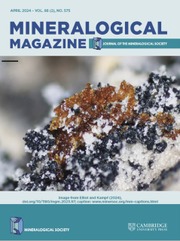Article contents
Microbiological influences on fracture surfaces of intact mudstone and the implications for geological disposal of radioactive waste
Published online by Cambridge University Press: 05 July 2018
Abstract
The significance of the potential impacts of microbial activity on the transport properties of host rocks for geological repositories is an area of active research. Most recent work has focused on granitic environments. This paper describes pilot studies investigating changes in transport properties that are produced by microbial activity in sedimentary rock environments in northern Japan. For the first time, these short experiments (39 days maximum) have shown that the denitrifying bacteria, Pseudomonas denitrificans, can survive and thrive when injected into flow-through column experiments containing fractured diatomaceous mudstone and synthetic groundwater under pressurized conditions. Although there were few significant changes in the fluid chemistry, changes in the permeability of the biotic column, which can be explained by the observed biofilm formation, were quantitatively monitored. These same methodologies could also be adapted to obtain information from cores originating from a variety of geological environments including oil reservoirs, aquifers and toxic waste disposal sites to provide an understanding of the impact of microbial activity on the transport of a range of solutes, such as groundwater contaminants and gases (e.g. injected carbon dioxide).
Keywords
- Type
- Research Article
- Information
- Copyright
- Copyright © The Mineralogical Society of Great Britain and Ireland 2011
References
- 11
- Cited by


